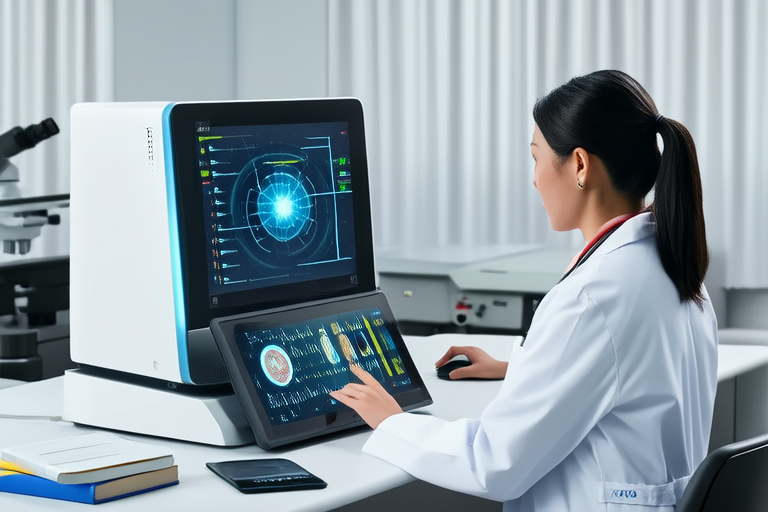The Intersection of Machine Learning and Healthcare: Innovations Unleashed
Introduction
Machine learning (ML) is a subset of artificial intelligence (AI) that enables systems to learn from data and improve their performance over time without being explicitly programmed. In recent years, ML has emerged as a transformative force across various industries, and healthcare is no exception. The integration of ML into healthcare promises significant advancements, from enhancing diagnostic accuracy to personalizing treatments and improving patient outcomes. The intersection of these two fields is crucial because it leverages the vast amount of healthcare data available today, transforming it into actionable insights that can revolutionize patient care.
Data Analysis and Diagnosis
One of the most significant applications of ML in healthcare is in the analysis of large datasets to aid in the diagnosis of diseases. By processing and interpreting complex patterns within medical records, imaging scans, and genetic information, ML algorithms can identify subtle signs of illness that might be overlooked by human practitioners. For instance, deep learning techniques have been employed to analyze medical images, such as X-rays and MRIs, to detect early-stage cancers like lung cancer with high precision. Similarly, ML models have shown promise in diagnosing cardiovascular diseases by analyzing electrocardiogram (ECG) signals. These advancements not only enhance diagnostic accuracy but also reduce the time required for diagnosis, potentially saving lives.
In the realm of neurological disorders, ML algorithms have demonstrated remarkable capabilities. For example, they can predict the onset of Alzheimer’s disease by analyzing brain scans and cognitive test results. This early detection allows for timely interventions that can slow down the progression of the disease and improve quality of life for patients. Another notable application involves the use of ML in diagnosing rare genetic disorders. By comparing a patient’s genetic profile against a database of known mutations, ML models can identify potential causes of a disorder, guiding clinicians towards appropriate diagnostic tests and treatments.
Personalized Medicine
Personalized medicine represents another area where ML is making a substantial impact. Traditional approaches to healthcare often rely on generalized guidelines based on population averages, which may not account for individual variations in genetics, lifestyle, and environment. However, ML enables the creation of tailored treatment plans by analyzing patient-specific data, including genomic information, electronic health records, and wearable device readings. This approach can lead to more effective therapies and better patient outcomes.
An illustrative example of personalized medicine comes from the field of oncology. ML models can analyze tumor biopsies and genetic profiles to determine the most effective combination of drugs for a particular patient. This targeted approach not only increases the likelihood of successful treatment but also minimizes side effects associated with less precise therapies. Furthermore, ML algorithms can monitor a patient’s response to treatment in real-time, adjusting the dosage or switching medications if necessary. Such dynamic adjustments can significantly improve survival rates and overall quality of life.
Predictive Analytics
Predictive analytics plays a vital role in leveraging ML for proactive healthcare management. By analyzing historical data and identifying trends, ML models can forecast patient deterioration, predict disease outbreaks, and optimize resource allocation. For instance, ML algorithms can analyze patient vital signs, lab results, and clinical notes to identify individuals at risk of developing sepsis, allowing for early intervention and preventing complications. Similarly, predictive models can anticipate seasonal flu outbreaks or pandemics by tracking public health indicators, enabling authorities to implement preventive measures and allocate resources efficiently.
Moreover, ML-driven predictive analytics can help hospitals manage their capacity and staffing levels more effectively. By analyzing admission rates, patient acuity scores, and historical data, ML models can provide accurate forecasts of future demand, ensuring that there are sufficient beds, equipment, and personnel to meet patient needs. This not only improves operational efficiency but also enhances patient safety and satisfaction.
Challenges and Ethical Considerations
Despite the numerous benefits, integrating ML into healthcare systems presents several challenges. One major concern is data privacy, as ML models require access to sensitive patient information. Ensuring that this data is stored securely and used ethically is paramount. Additionally, algorithmic bias poses a significant risk, as ML models trained on biased datasets may perpetuate existing inequalities in healthcare. Regulatory frameworks must keep pace with technological advancements to ensure that ML applications comply with legal standards while promoting fairness and transparency.
Ethical considerations also come into play when using AI in medical decision-making. Patients and providers alike need to trust that ML-based recommendations are reliable and unbiased. Transparency in the development and deployment of ML models is essential to build this trust. Moreover, it is crucial to involve diverse stakeholders, including ethicists, clinicians, and patients, in the design and evaluation of ML systems to ensure they align with societal values and promote equitable access to care.
Future Prospects
The future of ML in healthcare holds immense potential for further innovation. Real-time monitoring systems that continuously track patient vitals and adjust treatments accordingly could become standard practice. AI-assisted surgeries, where robots perform intricate procedures under the guidance of human surgeons, are already showing promising results and are likely to become more widespread. Continuous learning models that adapt to new data will enable ML systems to stay up-to-date with the latest medical knowledge, ensuring that they remain effective and relevant over time.
Furthermore, advancements in natural language processing (NLP) will facilitate more seamless interactions between patients and healthcare providers. Virtual assistants powered by NLP can assist patients in managing their conditions, providing medication reminders, and answering questions about symptoms. These tools can also support clinicians by summarizing patient histories and generating clinical notes, freeing up time for direct patient care.
In conclusion, the intersection of machine learning and healthcare is unlocking unprecedented opportunities for innovation. From enhancing diagnostic accuracy to enabling personalized treatments and improving predictive analytics, ML is transforming the way we approach patient care. While challenges and ethical considerations must be addressed, the potential benefits far outweigh the risks. As we continue to harness the power of ML in healthcare, we can look forward to a future where technology plays a central role in delivering high-quality, patient-centered care.


